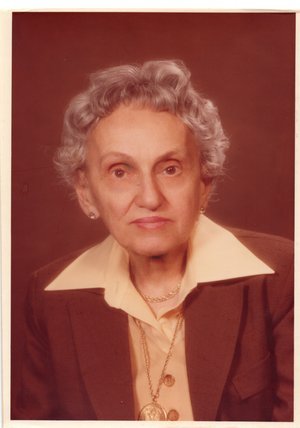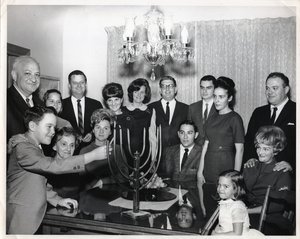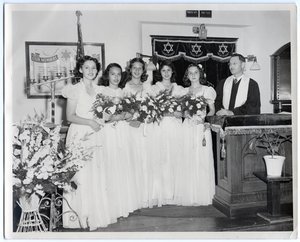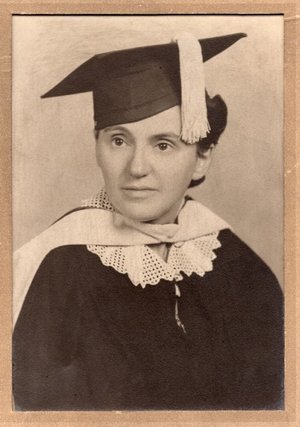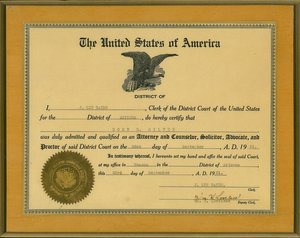Rose Silver
The Life and Legacy of Rose Silver
Rose Sosnowski Silver was a Jewish immigrant from Vienna, Austria, who became the second woman to graduate from the University of Arizona College of Law.
Rose Silver had a long and distinguished legal career in Southern Arizona, including being the first woman to serve as an Arizona county attorney. But her path to the legal profession was not a simple journey.
Rose (née Sosnowski) Silver was born in Vienna, Austria, on June 10, 1907. In 1910, as pogroms were occurring throughout Europe, Rose was hidden under blankets in a chest to evade capture by threatening soldiers. Her family escaped to Paris, France, then traveled on to Canada, and immigrated to America where they lived in Detroit, Michigan, in the early 1910s.
In high school, Rose earned high scores in debate and assisted her father with his own legal challenges. Following high school, she moved to Tucson with her soon-to-be husband, James Jacob Silver. James suffered from symptoms related to tuberculosis that required a desert climate to maintain his health. In Tucson, Rose applied to the College of Law at the University of Arizona. Despite a prior year of law study at the University of Detroit, she was initially rejected because the dean of the college believed she would be “taking the place of a man.” She was later accepted into the program and completed her degree with high honors and distinction in 1930, the second woman to graduate from the University of Arizona College of Law.
Initially unable to find work at local law firms because of her gender, Rose taught bar review courses for those who wished to independently pursue law outside of a university setting. James, who had been in real estate and wanted to change careers, was one of her first students. Evo DeConcini, who later became the Attorney General of Arizona, was another of Rose’s students. Rose and James opened their own private practice in 1935, while beginning a family of their own, which eventually grew to include five children. Rose’s earliest work as an attorney was representing “unfavorable” clients, including African American soldiers at Ft. Huachuca who were typically unable to find legal representation, as well as bootleggers and gangsters. Her most famous early assignment was in defense of John Dillinger after his arrest and capture in Tucson in 1932.
Rose ran her practice with James competitively but in 1944 decided to go back to school for a degree in history. After receiving her degree from the University of Arizona, she taught at Roskruge Elementary while maintaining a full schedule of motherhood. Her last three children were born during these years.
Rose returned to the law practice after it had grown significantly. In 1954, Rose and James’ son-in-law Jack Ettinger joined their practice, and in 1961 their son-in-law Gene Karp also joined. In 1962, Norman Green, the county attorney, asked Rose to lead the civil division, and she left the family practice. In 1969, she was appointed Pima County Attorney. She was the first female county attorney in the state of Arizona, a position that she held until 1972.
As Pima County Attorney, Rose paved the way for innovative work, including the aspiration to create a Victims Fund. She wondered, “Who worries for the victims of crimes? A fine citizen gets hurt, but who helps him?” She voiced her concern for this issue loudly throughout the county government and referenced histories of law in England, where there was a tradition of funds to help victims. Pima County did not have the finances to support such a groundbreaking idea during Rose’s tenure. A victim’s fund was eventually put into action by one of Rose’s successors to the county attorney seat.
Following her tenure as county attorney, Rose went on to become the legal advisor to the Board of Supervisors, a position she considered the most intriguing and challenging within her time in the civil division. She held the advisor role until retirement in 1987, having mentored many of the young attorneys in the county attorney's office who sought her guidance because of her innovation, generosity and intellect.
Rose’s commitment to law and her practice did not waiver, but her desire to work until her final days was abbreviated by the onset of Alzheimer’s disease, which she lived with until her death in 1994. Her legacy of law and justice has been carried forward by hundreds of students and two generations of her own family.



